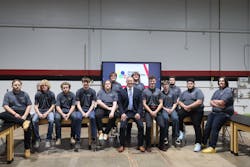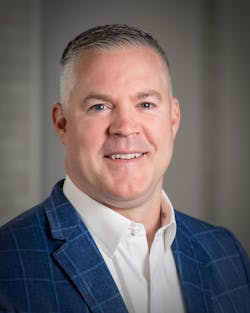How and why to tap into a new workforce for the plastics manufacturing industry
By Mac Jones,
president of Milacron and senior VP of Hillenbrand
It is difficult to imagine today’s world without the creature comforts we use every day. Durable plastics play a key role in our lives as they are used to make medical devices, consumer goods, car parts, computers, electronics and more.
We will always need a strong workforce to manufacture these products; however, manufacturing industry leaders are faced with a unique challenge as baby boomers begin to retire and we experience ongoing workforce shortages that may result in an estimated 4 million unfilled jobs over the next decade.
Yet, with every challenge comes great opportunity. College enrollment rates are down, and more Americans are foregoing traditional college in favor of career-connected pathways, vocational and trade skills training. As manufacturing leaders, we have the chance to tap into this group of highly skilled workers who may not have previously considered a career in manufacturing.
Manufacturing leaders have an obligation to show their communities and the public the advantages of pursuing a career in manufacturing. Doing so accomplishes two goals: quickly skilling up Americans to obtain high-paying, rewarding jobs now, without a traditional college education, and easing future workforce shortages.
Bring women to the table
Diversity, equity and inclusion (DE&I) efforts are incredibly important to manufacturing organizations, and to me. As the executive sponsor of Hillenbrand’s “Women of Hillenbrand” Business Resource Group, I am honored to support women in my organization to help them create global connections that elevate their voices and impact. Women made up 56.8% of the labor force in the U.S. in 2022, but they account for just 29% of manufacturing positions.
More women are a part of the workforce than ever before, and as manufacturing leaders, we should be encouraging and recruiting women for manufacturing careers. Making strides to close the gender gap is vital. Hillenbrand partners with companies like Girls Inc. to help advance the next generation of female STEM leaders through education. Their programs support young girls in identifying, entering and thriving in STEM-focused fields beyond high school. This type of exposure and education can inspire girls to follow a manufacturing career path early and is a key group to reach while educating and making investments in your local communities.
Education is key
Raising awareness in your communities about the manufacturing profession is another crucial step. There are misconceptions out there wherein people believe manufacturing is a low-skill profession. In reality, it is a strong career path that offers exclusive opportunities to learn important tactical skills and work in a fast-paced, growing industry that is making what the world needs to thrive.
Manufacturing is a highly skilled profession and requires workers to operate complex, high-tech equipment and receive continuous education and hands-on training. Manufacturing is incredibly diverse and the skills you develop are transferable as it spans many industries such as industrial, consumer products, durable plastics, electronics, chemicals, food and drink, and more. Manufacturing associates will experience incredibly fulfilling careers as they watch the items they make come to life, every day.
Partner with and invest in your community
Trade organizations and career centers work directly with students by preparing them for jobs in manufacturing or other skilled trades. Creating partnerships with them is a strategic investment for businesses to build a guaranteed pipeline of easily adaptable, skilled talent.
Career centers can serve as pathways to apprenticeship programs that allow students to gain skills through hands-on experience and training. We know experience is vital in this field because it allows an individual to practice what they learn in real time, and network with full-time employees and peers in the industry.
For example, Milacron, one of Hillenbrand’s operating companies, has partnered with the Grant Career Center in Ohio to develop a capstone program for high school seniors enrolled in this technical school near the company’s global headquarters. Graduates from Grant learn a firm foundation in manufacturing through hands-on experience in machine mechanics that could transfer to full-time positions at one of Milacron’s neighboring facilities. Partnerships like these provide students with a direct line to future potential employment opportunities and firsthand experience in the industry, without attending a traditional four-year college.
Career fairs can also be key, not only with high school students but with college students, too. It is important that you don’t forget about students who are already in college studying engineering and other manufacturing careers. Engaging with talent from a combination of career centers, trades and apprenticeship programs, and educational institutions provides the strongest talent pool to grow the industry.
The modern durable plastics manufacturing industry is a major contributor to the global economy due to the vital products produced and used around the world. As millions of manufacturing jobs remain unfilled, it is crucial that we are proactive in building new pipelines of potential employees. It is up to manufacturing leadership to think more strategically and creatively about how to appeal to different talent pools and provide them with the resources and upskilling opportunities they need to thrive. These are just a few strategies for building fulfilling careers in manufacturing that may impact individuals and the economy for generations to come.
Mac Jones is the president of Milacron and senior VP of Hillenbrand. Prior to joining Milacron, Jones served in a number of senior leadership roles with GE Aviation and Hill-Rom. Mac is a graduate of the University of Kentucky with a Bachelor of Science degree in accounting, and a Master of Business Administration from The Ohio State University.

